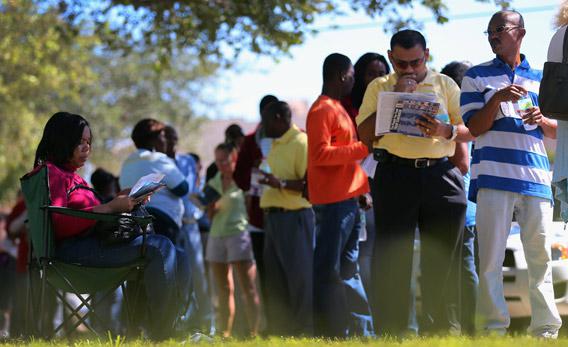Hurricane Sandy forced Gallup to suspend its daily presidential election tracking poll on Monday. Gallup is just one of many polls, but if all of them disappeared, would it change the outcome of the election?
It’s unlikely. Studies by political scientists and psychologists suggest that holding a lead in opinion polls earns a candidate no more than a 4-to-5-percentage-point bump among undecided voters. (The effect is stronger in primaries than in a general election.) In most states, that’s a negligible change. Consider Colorado, where recent polling data suggests that only 5 percent of voters are still undecided. Assuming that turnout will be approximately equivalent to 2008, that means there are just 120,000 votes remaining to be won. President Obama’s narrow advantage in most state polls would win him, at best, 6,000 of those votes. It’s highly unlike that this number of people will swing the outcome. Florida, which may still hold as many as 750,000 undecideds, presents a somewhat more interesting prospect. Romney’s small polling lead there could give him an additional 38,000 votes—still a small amount in most presidential elections, but it wouldn’t be the narrowest win in Florida history.
Commentators sometimes refer pejoratively to voting based on opinion polls as the “bandwagon” effect, and there are plenty of bad reasons to vote based solely on polling data. Some political scientists believe that heavy reporting on opinion polls causes voters to view the campaign as a “horse race,” in which the only objective is to pick the winner. Polling data also has what psychologists refer to as “normative social effects”: Some people simply don’t like straying from the pack. There is also the possibility that people use polling data to predict the future, and imagine that their future selves will prefer to have voted for the winner. (People likely rely on this strategy more heavily when choosing positions on issues than when picking a candidate. If you believe that gay marriage will eventually be legal everywhere, it makes sense to endorse it now. Your future self won’t have to change his mind or face the judgment of others.)
There is also a perfectly legitimate reason to vote based on opinion polls. Many voters who are undecided feel they don’t have enough information to make a good decision, and the view of the majority may be based on superior knowledge. Just as shoppers rely on Amazon ratings, and diners trust Zagat scores, these voters make their decisions based on the community’s opinion.
A pair of researchers from Stanford University and Microsoft attempted to tease apart these reasons and determine the basis of the bandwagon effect in a study that came out in October. Before asking voters for their views on three policy issues (free trade agreements, public financing of elections, and immediate withdrawal of troops from Afghanistan), they presented them with different forms of polling data. The researchers found that exposure to opinion polls did, in fact, move public opinion, but certain kinds of opinion polls had stronger effects than others. For example, voters are more likely to adopt a policy position if they are told that a poll of experts endorses it than if the poll represents the opinions of the general public. When told that the poll involved respondents who were demographically similar to themselves, voters were less likely to adopt the poll’s winning viewpoint. The results strongly suggest that voters who make decisions based on polls are likely relying on the wisdom of the crowd, not simply trying to conform to their peers.
Got a question about today’s news? Ask the Explainer.
Explainer thanks Stephen Ansolabehere of Harvard University and Neil Malhotra of Stanford University.
